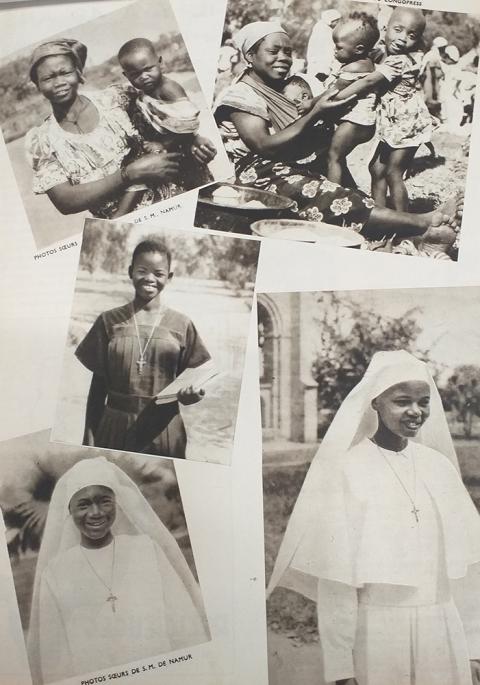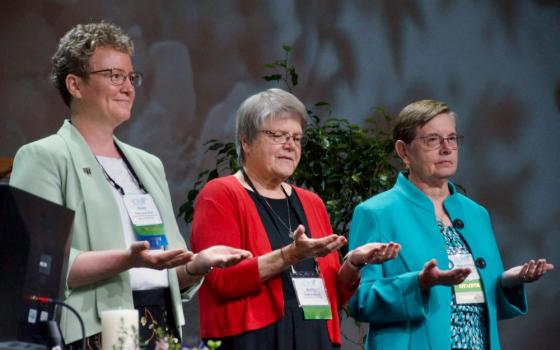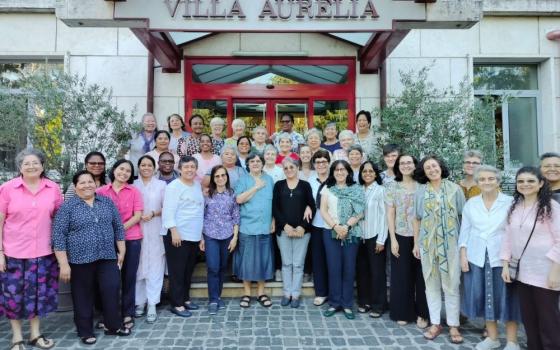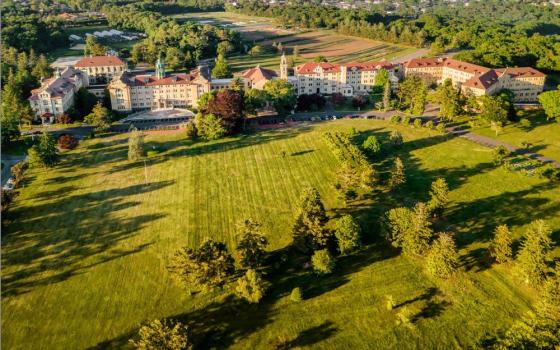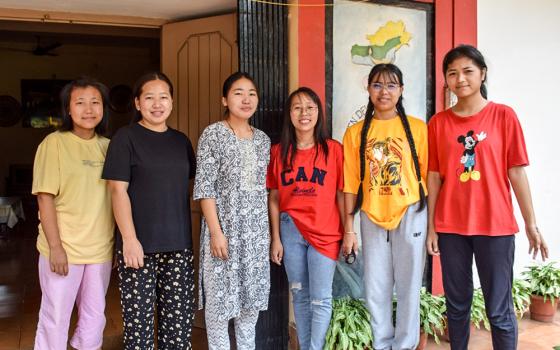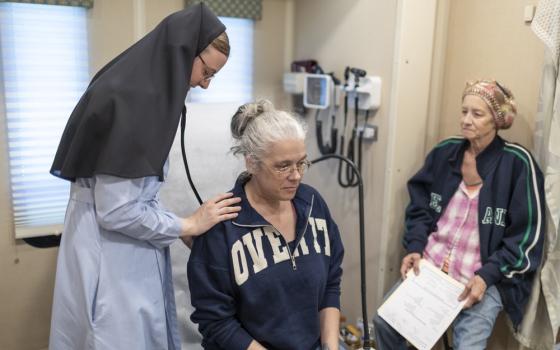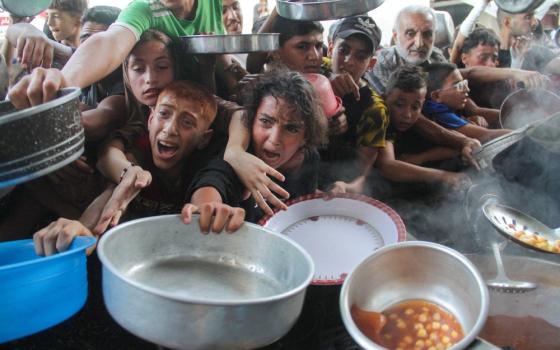
This image from Michel Chambon's Initiative for the Study of Asian Catholics April 2022 lecture on "The ministry of Chinese Catholic nuns, past and present" was taken in the chapel of the convent of Shenyang, in northern China. (Courtesy of Michel Chambon)
Scholarly interest in nuns and sisters has flourished in recent years as historians increasingly acknowledge that history cannot be written without an understanding of religion, specifically, of the history of Catholic women religious.
New networks of researchers are promoting inquiry into women religious from medieval times to the 21st century. One of these is the International Scholars of the History of Women Religious Association, or ISHWRA, which was established in 2021 by Cormac Begadon, Sarah Barthélemy and Gemma Betros. The network aims to be transnational and multidisciplinary, welcoming scholars and non-scholars alike.
One challenge the trio of young scholars has identified is that the history of women religious has tended to exist in national, regional and chronological silos.
"We found that people often weren't looking beyond these regional silos," said Begadon, a history fellow at the Department of Theology and Religion at Durham University in Durham, England. "When you're working on such specialized things, much of your time is spent on localized topics. We wanted to break down these barriers and facilitate inquiry and learning from each other."
Betros, an honorary lecturer in the School of History at Australian National University, said that the association's main aim "was to establish a global network that could act as a point of contact for scholars working on the history of women religious in any period and in any part of the world."
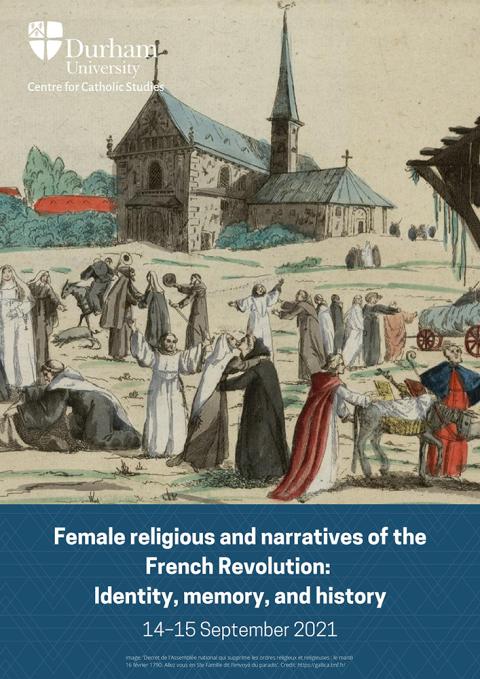
The association is not the only network of scholars focused on the history of women religious, Sarah Barthélemy, its third co-founder, explained. But other associations usually have a more focused research object.
"We have strong links with Project Sorores, supported by the École Française de Rome and the Casa de Velázquez of Madrid, on European non-cloistered female religious life," said Barthélemy, who is Catherine de Francheville Fellow in the history of Catholicism at Durham University and a visiting professor at Université Saint-Louis in Brussels. "One of their coordinators, Sergi Sancho Fibla, is part of our advisory panel. We hope to open a space for collaboration on a global scale."
Researching women religious in revolutionary and Napoleonic France, Betros was aware of other scholars working in similar areas, but "we rarely crossed paths. As a result, I had long felt I was missing out on collaborative opportunities that are central to academia in the 21st century."
By making research accessible and opening up the network, Begadon said the association hoped to bring together scholars working in Western Europe, North and South America, Africa, Asia and Australasia. "We wanted those working on the 20th century to learn from people working on medieval history and people working on the 17th and 18th centuries to look at the 19th century and so on."
"If you were to look at the number of scholars looking at female religious as opposed to male religious right now, especially in the Anglophone world, it is weighted heavily on the female side," Begadon said. One reason for the growing interest, he said, is the archival legacy many congregations have left. "It has given us a snapshot into the lives of females, which is not always there for uncloistered non-religious women."
There is also agreement that this is an area that has been overlooked for too long. Even as the impetus to recover women's history gained momentum in the last decades of the 20th century, "nuns were considered of little interest due to their perceived lack of agency," Betros explained.
Also at play was a "long and somewhat prurient interest in nuns, which perhaps reached its height in 18th-century France. The association hopes to direct attention away from nuns "as figures of fascination or amusement or disdain to a group of women, like any other, whose stories and experiences deserve and need to be made known and understood within their broader historical contexts," Betros said, adding that he believes religious congregations' "extraordinary records" have the potential "to illuminate the history of our societies in ways we are only just beginning to understand."
This more nuanced approach is welcomed by many religious. Sr. Helen Jacobson, a member of the Sisters of St Francis of Philadelphia for more than 53 years, has been the archivist for her congregation for the past 20 years.
"Women in general — and sisters in particular — are unsung heroes whose stories have been hidden and disregarded for far too long," she told GSR. Through the International Scholars of the History of Women Religious Association, she has learned about several topics from different perspectives on matters of interest to women religious, especially in the United States.
"It is interesting to learn about other religious congregations; to compare and contrast similar or unique circumstances regarding how decisions were made regarding a wide range of topics in the past as well as those being made today," she said.
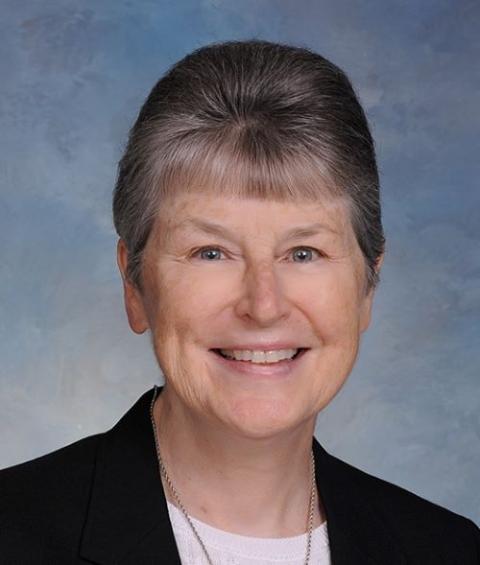
Sr. Helen Jacobson, a member of the Sisters of St Francis of Philadelphia for more than 53 years, has been the archivist for her congregation for the past 20 years.
In recent years, many religious congregations have been more open toward researchers accessing their archives. Betros recalls visiting the archives of several orders in Paris in the mid-1920s and finding "some reticence in allowing an outsider to examine documents." She is acutely aware of how easily archives could be lost or destroyed.
"As more communities come to the end of their journeys — the Sisters of Charity of Saint Vincent de Paul of New York, for example, recently issued a press release about their 'path to completion' — I suspect the future of their archives are a source of concern for many," Betros said.
The growing interest among researchers stems from the accessibility of religious congregations' archives, Begadon said.
"I think one of the reasons we have had this explosion in research is that the archives of a growing number of religious congregations are now open for business," he said. "Many congregations now employ professional archivists, and they are doing their utmost to facilitate researchers, but more could be done."
He also believes there is "a growing thirst to get a fuller picture of the history of female religious and their activities" among a younger generation of scholars who have a different experience and perspective of women religious. But he stresses the research that the association is facilitating is not about providing a platform simply for "good news" stories.
Advertisement
He also believes there is "a growing thirst to get a fuller picture of the history of female religious and their activities" among a younger generation of scholars who have a different experience and perspective of women religious. But he stresses the research that the association is facilitating is not about providing a platform simply for "good news" stories.
In a piece on the association for the Centre for Catholic Studies in Durham's newsletter, GSR sister liaison, Sr. Joyce Meyer, highlighted that women religious have lived through extraordinary experiences of mission, war, oppression, revolution, all the while serving and working with others to make the world a better place. She said the stories revealed through the association's research "has brought me sadness, joy, amazement, disappointment and even at times, anger; but no matter the feelings they evoke, the stories open consciousness of how God's Spirit has led and continues to lead women through their particular historical contexts, even though at times misguided, in their desire to spread God's realm."
Currently, the association's principal output is a series of monthly seminars as well as biennial workshops, which focus on very specific themes. Some seminars are hosted in hybrid form in order to facilitate global participation. According to Begadon, more than 600 people from more than 50 countries have registered for events. "We have quite a geographical spread and we're not restricted to scholars," he said. " Recently, we have had quite a few religious join us from Kenya, Uganda, Rwanda."
The seminar series is deliberately broad, covering subjects such as institutional racism within the orders themselves, the emergence of East African congregations, and women religious in American secular institutions of higher education.
Papers presented at the association's first workshop in 2021 are set to be published by Boydell & Brewer as an edited collection, Female Religious and Narratives of the French Revolution: Identity, Memory, and History. It is Begadon's hope that in time International Scholars of the History of Women Religious Association will have a published series looking at specific research themes. Another long-term goal is to secure funding from donors to enable the association to staff the network and fund research projects.

